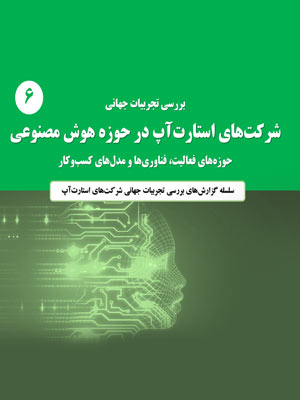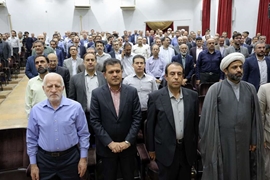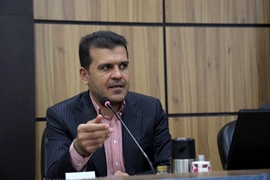Dehghani in Sima's special news interview program;
Reducing the evaluation process time of knowledge-based companies to less than 20 days
The vice president of science, technology and knowledge-based economy, appearing in the special talk program of Sima news, announced the implementation of the new evaluation system for knowledge-based companies with the approach of creating new companies and proportionalizing the support of companies according to the role and mission of each.

According to the Communication and Information Center in the Vice Presidency of Science, Technology and Knowledge-Based Economy, Ruhollah Dehghani, the Vice President of Science, Technology and Knowledge-Based Economy, while participating in a special news interview program, announced the implementation of the new evaluation and support system for knowledge-based companies and said: based on the Law on Support for Knowledge-Based Companies approved in 1989, regulations were approved and implemented for 12 years with few changes, which can be seen from the achievements and results of the implementation of this law. He pointed to the formation of nearly 9,000 knowledge-based companies, the production and development of thousands of knowledge-based products and services. Over time, with the growth and maturity of the technology and innovation ecosystem of the country, the experiences gained from the implementation of this law, the increase in the number of products and the change in conditions, the weaknesses and strengths of the law supporting knowledge-based companies and institutions were determined.
Dehghani continued: "We have repeatedly received concerns and feedback from knowledge -based companies and activists of the law, the most important forms raised by the major knowledge -based and professional activists, that the evaluation index was the same for all companies, for example, more than 10 years of business.
He considered another of the discussed expressions to be the focus of the previous evaluation regulation only on the technology level of a company and paying less attention to the growth rate and outputs of that company and added: The focus of the evaluation was on what technology the company is working on, and it was evaluated based on the complexity of the technology without considering what problem the company and product or service has solved. This caused less acceptance in areas where we had lower technologies and companies were less inclined to be knowledge-based, for example, in agriculture, which has lower levels of technology, fewer companies announced their presence, or in the field of pharmaceuticals, where our country moves in step with the world's technological progress, the concentration of companies is more.
The vice president of science, technology and knowledge-based economy considered the two challenges of inaccuracy and time-consuming as another damage of the previous evaluation process and stated: In addition, in the previous evaluation system, the role and effectiveness of an important part of the key actors of the technology and innovation ecosystem, such as science and technology parks and research centers, which could play a role in evaluation and knowledge-based processes, was given less attention.
Referring to the entry of agents into the internal matters of companies for evaluation, Dehghani added: The support was not received according to the growth and maturity of the companies, these were the main issues that big companies were concerned about, and with the maturity of knowledge-based companies, more elegant clothes were needed for these companies.
The head of the National Elites Foundation, stating that in the shadow of the approval of the knowledge-based production leap law, a very good opportunity has been provided for a new form of support to create new companies and to help knowledge-based companies to play a greater role in the economy, he continued: 9 thousand companies created a good crime, but the time had come for these companies to play a more serious role in the life and progress of society. Intensive studies and research that lasted for 6 months and was compiled with the participation of more than 100 powerful and large knowledge-based companies and received the opinions and views of dozens of experts, experts and thinkers, provides a good opportunity to create the necessary motivation and platform for new knowledge-based companies, knowledge-based companies to play a more prominent and serious role in the life of the society and the progress of the country's economy.
Balanced development of knowledge-based companies
Referring to the criteria for assigning knowledge-based names to companies in the form of the new evaluation system, the vice president of science, technology and knowledge-based economy stated: The focus of the previous regulations for the evaluation of knowledge-based companies was mainly on the level of product technology, but in the new evaluation system, products, processes and services are also considered in the way of knowledge-based evaluation. Considering these 3 criteria, the company works on technology that has a higher level in that field than the average technology of the country.
The Vice President of Science, Technology and Knowledge-Based Economy, referring to handing over the evaluation process of new knowledge-based companies to trusted, expert and capable science and technology parks under a new system of evaluation and support for knowledge-based companies, continued: During the past ten years until now, the evaluation process was assigned to evaluation brokers, which had shortcomings and conflicts of interest. Foundation and technology were in contact, they have found enough expertise and experience in knowing these companies and their needs and the priorities of the country. Accordingly, a part of the evaluation process of knowledge bases in the form of a new evaluation system has been assigned to 10 famous and capable and specialized science and technology parks. These science and technology parks evaluate new knowledge bases, and with the approval of the Vice Presidency of Science, the names of knowledge based will be assigned to companies; There will definitely be follow-up supervision by the Vice Presidency of Science, Technology and Knowledge-Based Economy so that this process is implemented properly.
Stating that the allocation of evaluation to selected science and technology parks from all over the country helps in the balanced development of knowledge-based companies, he stated: In this new approach, the number of companies will grow based on a balanced regional model, while the speed of evaluation and approval will increase and there will be no need to refer to the Vice Presidency of Science. Applicant companies can get the needs and answers to all their questions by referring to each of these 10 evaluation centers and be placed in the knowledge-based process.
The vice president of science, technology and knowledge-based economy, stating that the process of reviewing and evaluating knowledge-based studies in the previous evaluation system lasted between 50 and 90 days, announced the significant increase in the speed of the evaluation process in the form of the new evaluation system and added: The prediction is that the evaluation time in the evaluation system will be reduced to less than 20 days. With the implementation and unveiling of the new evaluation system in the next 2 months, the process will speed up. Of course, this system has been implemented manually since today, and companies can submit their request based on this new form of evaluation.
Referring to the consideration of the country's strategic priorities in the list of knowledge-based goods and services based on the new evaluation system, Dehghani said: This list includes the titles of products including technological goods and services with superior technologies compared to the average level of existing technologies in the country, which is compiled, updated and published by the secretariat based on the rules of the steering council of knowledge-based technologies and productions. In compiling this list, in addition to technological level considerations, technological and innovative products and services related to strategic and national priorities and competitive advantages of the country's main economic sectors are taken into consideration.
He stated that in the framework of the new knowledge-based evaluation system, based on the type of process, type of product and type of service they provide, companies are divided into 3 categories: "new knowledge based", "innovative knowledge based" and "technological knowledge based" and according to this category they receive support according to their nature and needs. It was that it didn't create a good feeling, or sometimes it made the company's activists feel like second-class and third-class citizens of the technology and innovation ecosystem; However, based on the new evaluation criteria, companies are divided into these 3 groups according to the type of activity and mission they have, so that they receive their own development program and appropriate support.
Classification of companies in the new basic knowledge evaluation system
Explaining the division of knowledge base-based on nascent knowledge-based, innovative knowledge-based, and technology-based knowledge, he clarified: companies active in the field of research, design and development of technological goods and services that provide at least one product on a laboratory sample scale according to the list of knowledge-based goods and services are known as nascent knowledge-based companies; These companies have a focused research and development program and at least 50% of the company's cost is spent on research and development of the target product, while the operating income in the company's latest tax return is less than 50 billion Rials.
Dehghani added: innovative knowledge-based companies have at least one knowledge-based product or service in accordance with the approved list of knowledge-based goods and services, have centralized research and development program assets, and at least 50% of the company's expenses are spent on research in the development of the target product, and the operating income in the company's latest tax return is more than 50 billion Rials. Also, the sales share of the company's knowledge-based goods or services is less than 50% of the company's total sales.
The vice president of science, technology and knowledge-based economy said about knowledge-based companies: These companies have a sales volume of more than 5 billion Tomans, more than 10 people and more than 50% of their sales come from knowledge-based products, services and processes.
He continued by stating that in the new evaluation companies are evaluated in relation to the average available technologies of the country in each field: before this, companies had to have a certain level of technology to become knowledge-based, and the evaluation criterion was the same for all companies. In the new division, companies are divided based on the technology level of the country in the same field. One of the serious concerns of the companies was entering into strategic fields but with a lower level of technology, such as agriculture. Agriculture has a lower level of technology than fields such as medicine and biotechnology, but it is an effective and strategic field and should not be evaluated with the criteria of a technological field such as biotechnology. Based on this, we set the knowledge-based criterion of a company to be the higher level of its technology compared to the country's technology level in the same field of its activity.
The vice president of science, technology and knowledge-based economy, stating that the size of companies and their growth rate are two important criteria in the evaluation of knowledge-based companies based on the new system, continued: In the previous regulation, only products and services based on the level of technology were the criteria for evaluating companies, but the size of the company and its growth rate are one of the main and important criteria for knowledge-based companies.
Dehghani, referring to the growth plan of the companies as one of the components in the evaluation of scholars, said: the growth plan is the same plan presented by the company, which includes; Growth in the fields of sales, exports, specialized employment, obtaining necessary approvals, standards and licenses for the wide supply of products in domestic and foreign markets, the development of knowledge-based products portfolio, the growth rate of the amount of capital formation and attraction, and the amount of technological cooperation.
Creating motivation for knowledge-based companies
Referring to the role of the new evaluation system in increasing the number of knowledge-based companies by creating incentives and allocating appropriate and balanced support to companies, Dehghani said: There are two approaches to increase knowledge-based companies, the first approach is to increase the speed of evaluation. Although this approach is good, it is not positive and constructive. In addition to speeding up the evaluation process, we need new approaches that help by encouraging the creation of new companies. In this regard, the new system of evaluating and supporting knowledge-based companies, with proportionality and balanced allocation of support, provides the basis for the creation of new start-up companies by motivating academics, experts and capable people who were concerned about establishing their own knowledge-based companies. Reassuring these people that they have support such as financial exemptions helps them to be encouraged and motivated to create knowledge-based companies.
He stated that the new evaluation system helps in better allocation of exemptions to start-up companies that urgently need this type of support for growth and maturity, and added: Studies and reviews have shown that more than 80% of the total tax exemptions allocated so far, which is more than 12 thousand billion Rials, was allocated to 10% of knowledge-based companies, while with a figure of less than one thousand billion Tomans, the need can be 80% from companies to tax exemptions.
He added: Therefore, the existence of a smart and accurate system for allocating support according to the needs of each company is necessary, and especially start-up companies urgently need these exemptions and facilities to encourage and continue their existence. Therefore, in the new evaluation system, support such as tax and military exemptions is allocated to smaller companies in order to enjoy a greenhouse environment for continued life and maturity, and larger companies such as innovative knowledge-based companies, which have greater needs than tax exemptions, benefit from tax credit. Technology companies can use their taxes in the form of credits for product research and development or new start-ups to develop new value chains.
Stating that we are trying to allocate support in such a way that companies are encouraged to express success and transparency, Dehghani continued: When clear, real and accurate criteria of a company such as size and growth rate are used as evaluation and support criteria, support is allocated according to these criteria, the growth and excellence of companies will also take place in a balanced way in the form of this transparent and accurate evaluation system, and companies will be encouraged and encouraged to grow and play a role in the economy of their country.
Creating a continuous value chain between the industry and the market
Referring to the role of the new evaluation system and support to create a connected chain from knowledge to industry and the market, the vice president of science, technology and knowledge-based economy said: based on this new evaluation system, create a connected chain of value and realize the university to industry and market. Start-up companies are formed in the heart of universities, innovative companies are formed with a bond to the start-ups, technological companies are formed with the maturity and connection of innovators.
Dehghani pointed to the smoothing of the path of formation of large companies and Pishran in the form of this new evaluation system and stated: there are nearly 600 companies that are more than 7%, which are in the category of technology companies because their number is less than the rest of the fields.
Stating that the departments of the ministries and large industries need partners to be able to solve major technological issues, he said: Last year, regulations were issued to the departments in line with the implementation of the Knowledge-Based Production Leap Law, and in parallel with that, the Vice Presidency of Science, Knowledge-Based Economy Development Headquarters was formed to connect knowledge-based companies to the country's major markets. This large market is generally provided to Knowledge-Based companies, and in this process, knowledge-based companies will be connected to the vast market of devices, ministries and large industries. Large and knowledge-based companies, of which 30 of these companies interact and cooperate with each other in the form of a group, and 50 companies are about to join this group, are interested in connecting with a specific and united society of companies and industries and developing their market while solving the country's strategic issues.














comment